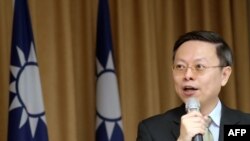TAIPEI —
Taiwan announced it will hold ministerial-level talks with China next month. The two sides are likely to discuss issues that would advance Beijing’s goal of unifying the two separately ruled sides.
Taiwan said Tuesday its China policy architect, Wang Yu-chi, will visit two Chinese cities from February 11 to 14. Wang, who is minister of Taiwan’s Mainland Affairs Council, will meet Zhang Zhijun, minister of China’s State Council Taiwan Affairs Office, during the visit.
The first such high-level meeting between the two sides presents an opportunity to discuss tough political issues that have kept the Asian neighbors deeply divided for more than 60 years.
Nathan Liu, an international affairs professor at Ming Chuan University in Taiwan, said public reaction may play a critical role in how much gets done at the talks.
“This will be an ice-breaking movement leading to real political discussion or political issues. If the reaction from the general public is good, not too much trouble, I think they’ll just go ahead,” said Liu.
There is no official agenda for next month’s meeting, but experts believe it could set the stage for, among other things, working out a peace accord and joining together in international organizations that now only allow China.
The two ministers also are expected next month to discuss establishing de facto consular offices. Those first-ever offices would service the surge in visits by Chinese and Taiwanese investors, and Chinese tourists visiting Taiwan.
China and Taiwan have been separately ruled since the civil war of the 1940s, but Beijing claims sovereignty over the island and has threatened to use force if peaceful reunification fails. In 2008, the two sides broke their impasse with a series of trade, transit and investment deals worked out by semi-official negotiators.
Democratic Taiwan still shunned political talks because much of the island’s public prefers to keep a distance from its Communist neighbor. However, last year Chinese President Xi Jinping publicly urged Taiwan to start talking politics soon. On Tuesday, China's Taiwan Affairs Office called the meeting an important move to develop relations.
Economic powerhouse China has used investment and trade perks to sustain informal dialogue with Taiwan since 2008, and analysts say it now wants to start covering topics that it cares about more, namely reunification.
The business community would welcome talks that ease tension, making China and Taiwan a safer place for long-term investment. Taiwanese, however, may protest if the ministerial discussions touch on issues that invite reunification.
Taiwan said Tuesday its China policy architect, Wang Yu-chi, will visit two Chinese cities from February 11 to 14. Wang, who is minister of Taiwan’s Mainland Affairs Council, will meet Zhang Zhijun, minister of China’s State Council Taiwan Affairs Office, during the visit.
The first such high-level meeting between the two sides presents an opportunity to discuss tough political issues that have kept the Asian neighbors deeply divided for more than 60 years.
Nathan Liu, an international affairs professor at Ming Chuan University in Taiwan, said public reaction may play a critical role in how much gets done at the talks.
“This will be an ice-breaking movement leading to real political discussion or political issues. If the reaction from the general public is good, not too much trouble, I think they’ll just go ahead,” said Liu.
There is no official agenda for next month’s meeting, but experts believe it could set the stage for, among other things, working out a peace accord and joining together in international organizations that now only allow China.
The two ministers also are expected next month to discuss establishing de facto consular offices. Those first-ever offices would service the surge in visits by Chinese and Taiwanese investors, and Chinese tourists visiting Taiwan.
China and Taiwan have been separately ruled since the civil war of the 1940s, but Beijing claims sovereignty over the island and has threatened to use force if peaceful reunification fails. In 2008, the two sides broke their impasse with a series of trade, transit and investment deals worked out by semi-official negotiators.
Democratic Taiwan still shunned political talks because much of the island’s public prefers to keep a distance from its Communist neighbor. However, last year Chinese President Xi Jinping publicly urged Taiwan to start talking politics soon. On Tuesday, China's Taiwan Affairs Office called the meeting an important move to develop relations.
Economic powerhouse China has used investment and trade perks to sustain informal dialogue with Taiwan since 2008, and analysts say it now wants to start covering topics that it cares about more, namely reunification.
The business community would welcome talks that ease tension, making China and Taiwan a safer place for long-term investment. Taiwanese, however, may protest if the ministerial discussions touch on issues that invite reunification.




